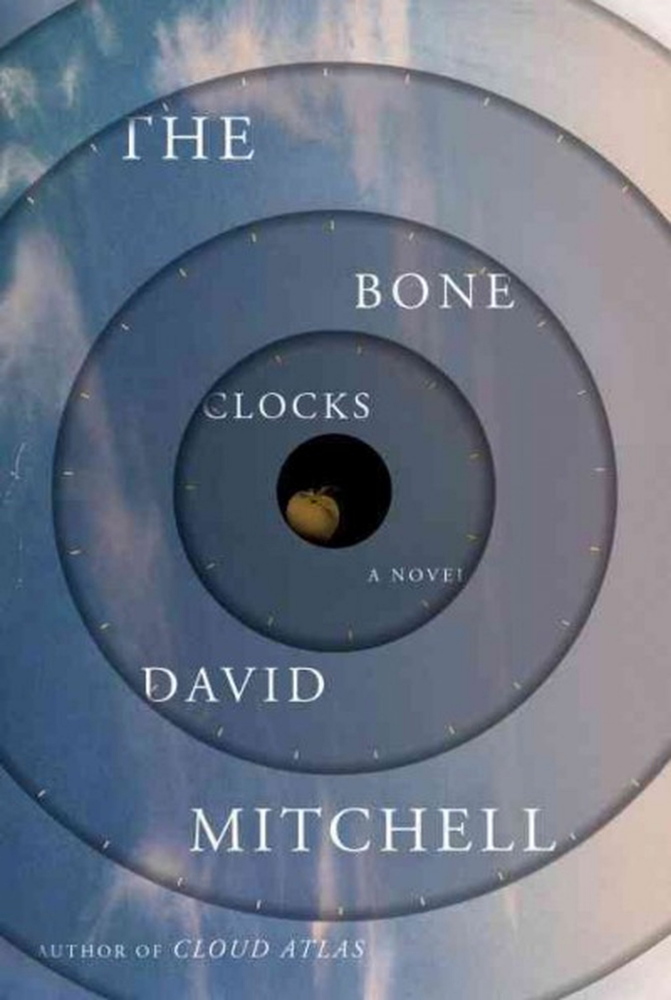Count on David Mitchell – whose novels regularly suggest a Borgesian library – to invoke one of the most famous literary labyrinths of all in “The Bone Clocks,” his extraordinary new novel:
“Half way along our journey to life’s end I found myself astray in a dark wood,” admits one of Mitchell’s protagonists – invoking the opening of Dante’s “The Divine Comedy” to describe his midlife crisis, which prominently features the decline of his once-promising career as a novelist.
It’s all full speed ahead for Mitchell’s own incredible career, consciously referenced in yet another Mitchell novel where wandering characters from prior Mitchell novels make an appearance.
This isn’t a cute literary game, but a variation on a key theme woven through all of Mitchell’s work: We’re bound to the lives going on around us as well as before and after us, lending significance to every life and each of our decisions. We may, as the narrator concluding Mitchell’s “Cloud Atlas” (2004) acknowledges, each be a lone drop in a limitless ocean. “Yet what is any ocean,” he asks, “but a multitude of drops?”
The drop diffused through each of the six sections of “The Bone Clocks” is named Holly Sykes, a 15-year-old English runaway when she narrates the first section, set in the Orwellian year of 1984. The ensuing sections are narrated by a Cambridge undergrad in 1991, a journalist stationed in Iraq in 2004, a middle-age writer between 2015 and 2020, a transmigrating immortal in 2024 and Holly again, living in the dystopian Ireland of 2043.
Each of these six sections – in what is Mitchell’s sixth novel – is a riff on one of the six storylines in “Cloud Atlas.”
For example, Hugo Lamb – a minor character in Mitchell’s “Black Swan Green” (2006) who narrates the second section of “The Bone Clocks” – recalls the dangerously charming, similarly voiced composer in the second section of “Atlas.” Ed, the war correspondent narrating the third section, is reminiscent of the muckraking journalist starring in the third section of “Atlas.” Holly, living through an environmentally depleted future in the sixth section, recalls the post-apocalyptic world of the sixth section of “Atlas.”
Each of these characters is embroiled in a long war pitting the Horologists – a group of benevolent and transmigrating immortals like Marinus, a character from Mitchell’s “The Thousand Autumns of Jacob De Zoet” (2010) who is currently inhabiting his 36th body – against evil, wannabe immortals. In another echo from “Thousand Autumns,” these human predators drink the blood of murdered innocents so they themselves can live on. Various characters, including Holly, encounter or cross over to the dark side.
If some of this makes your eyes glaze over – mine occasionally did, as I tried to keep up during portions of the fifth section, in which the fantastical elements are particularly prominent – you aren’t alone. Holly herself recalls one pitched battle by admitting that “if I ever described what I saw, it’d sound like attention-seeking, insanity or a bad trip.”
But is there much difference between the bad guys drinking human blood in a quest for immortality and the squandering of resources cataloged by Holly, as she admits in the moving and frightening final section that her generation ignored how it was robbing future generations in order to preserve “our cozy lifestyles”?
And when good guys like Marinus inhabit others’ minds to advocate better choices, what’s to distinguish their persuasive efforts from the workings of a troubled conscience – or from the ghostly shades providing a comprehensive tour of human history while guiding Dante toward Paradise?
Do such creatures’ struggles to turn us toward the light decrease our agency? Or, rather, do such struggles make every choice – in a novel with topics that include parenting, aging, the environment, love, religion and technology – seem even more vital?
It’s a sign of his ambition and a tribute to his ability that Mitchell’s own all-encompassing historical tour – spanning 10 centuries and six continents, with one character even hailing from Milwaukee – insistently prompts such questions.
We may each just be bone clocks, ticking down toward death. But characters like Holly remind us that we live on through our stories – and that how we tell them as well as who they touch will inevitably shape the stories to come.
Send questions/comments to the editors.



Comments are no longer available on this story